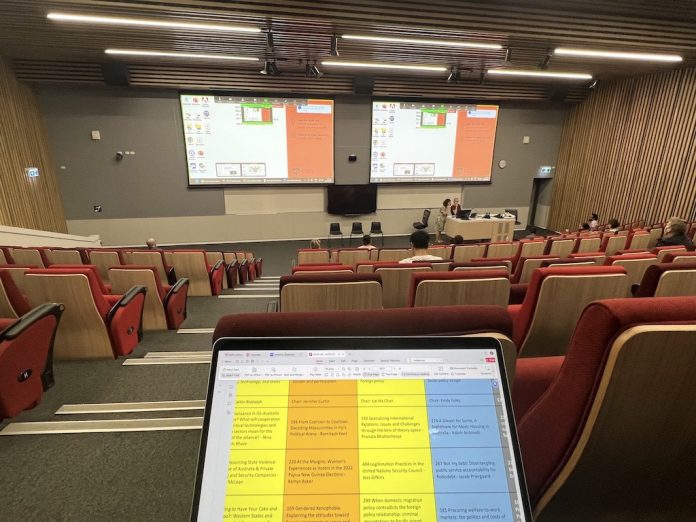Dr Caitlin Biddolph was among academics from all over the world to attend the 2023 Australian Political Studies (APSA) Conference at the University of Sydney from November 27-30.
Dr Biddolph gave a presentation on her current paper “Queer decolonial visions for theorising transitional justice otherwise”. The postdoctoral research fellow in gender and global governance at the University of Sydney focused on social and political issues in response to the APSA 2023 Conference theme, ‘Emerging from Crisis into Complexity’.
“Transitional justice tries to make sense of all the complicated ways that people try to deal with violence,” she said. “Transitional justice consists of mechanisms in response to conflict and human rights violations, and tries to address these issues in ways that prevent violence in the first place.”
Her research is mainly about a fairer world that acknowledges diverse gender identities and challenges colonial biases. Dr Biddolph’s paper presented three visions for queer decolonial approach to transitional justice.
The first vision is recognising intersectional harms, including experience of gendered, racist and colonial human rights violations.
The second vision is that a queer decolonial approach should challenge a lot of the ingrained gendered racist colonial assumptions of transitional justice.
“I’m trying to critique the global project of transitional justice and see how we can do it better,” she said.
The third vision is to amplify marginalised voices in transitional justice.
“ [It is] seeing the approach moving away from top-down to bottom-up, and how people affected by human rights violations are the ones leading these processes, like truth commissions or alternative forms of justice.”

Dr Biddolph added that there is potential for exploring new perspectives when society moves beyond institutional boundaries.
“Should we perhaps be abolishing or getting rid of a global transitional justice project if that is inherently exclusionary and rests on colonial ideas and hierarchies?” she asked.
The conference was a good chance to meet other academics and hear other people’s research.
“It’s nice to get questions on your work and see how you can improve it,” she said.
“You are never alone in your research, even if it might just be you writing it up.
“The conference is a nice place to get that collective spirit contribution and feel like your work speaks to other people as well.”
Dr Biddolph is a Postdoctoral Research Fellow in Gender and Global Governance at the University of Sydney.
Her research on transitional justice focuses on how it has developed into a global project that often reproduces cis-heterosexist, Western, (neo)liberal, and (settler) colonial logics about when and where transitional justice is done, to whom and by whom.
Global transitional justice has begun to recognise diverse harms, including colonial violence. Such recognition occurs within dominant transitional justice frameworks, doing little to challenge the exclusionary foundations on which the project rests.
“I was inspired to research TJ [Transitional Justice] because my prime research was looking at international law, looking at the international Criminal Tribunal for the former Yugoslavia,” Dr Biddolph said.
“I think being situated within a disciplined international relations and global politics we are quite interested in how people deal with violence, how we can come up with mechanisms and responses to seek justice and recognise victims and survivors and violence.”


